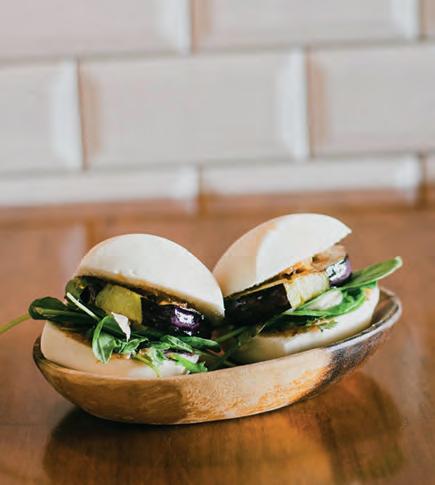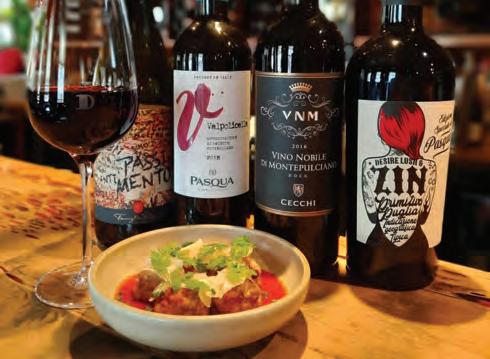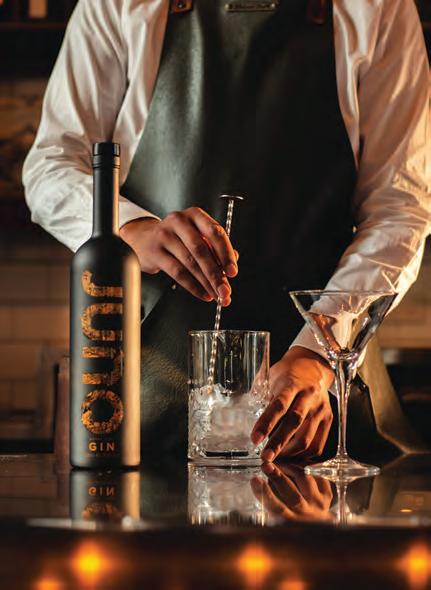
24 minute read
VEGAN VIBE - SOFIA ROGER WILLIAMS
from PONSONBY NEWS '21
SOFIA ROGER WILLIAMS: VEGAN VIBE
After a long and busy week, one can only ask for an escape from it all at dinner with the people you love. Janken Japanese on Jervois Road is all about delicate dishes packed with flavour in an intimate and welcoming environment.
This month, I had the perfect opportunity for a celebratory dinner with friends. The weather was not ideal this night, but the welcoming of the staff and aromas of the carefully executed food warmed us up. Despite not being an entirely vegan restaurant, their specially dedicated menu items and entirely plant based starters allow for it to be an enjoyably vegan friendly excursion.
Our goal, as it always is, was to try as much as we could eat on the menu. Although not necessarily being a sharing type of menu, this was easily done. We ordered a variety of dishes but all collectively decided that the vegan steamed buns were the highlight - particularly the eggplant steak and sweet miso one. The eggplant was beautifully cooked and seasoned - covering both the sweet and salty elements of one’s palate. It was so good that our table struggled to share.
Tofu is very much a prominent element in most of Janken’s vegan dishes - perfect for those of us who are fans. But this doesn’t mean that Janken’s vegan menu becomes complicated for those sceptical of it. As an individual ingredient, tofu can be bland and unappealing, but as I’ve always said, tofu is only good when it’s been treated well. Janken is the place for those of us that have never had good tofu, or haven’t tried it at all, to perhaps change their perspective of it. So much so, that one of my friends found that despite her previous experiences with it, she now liked tofu.
Along with these dishes we also shared the shojin tofu crumbed with quinoa puffs, nanban-style karaage tofu and the tonkotsu ramen with spicy miso. These were all thoroughly enjoyable and lovely to share between the four of us. The quinoa puff crumbed tofu was like nothing I had ever had before, and was paired perfectly with Janken’s iconic shojin sauce. The vegan take on the classic karaage chicken, karaage tofu, was equally delicious and the flavour was unmatched compared to the other dishes.
The tonkotsu miso ramen encompassed all of those warm classic umami flavours. The noodles were beautifully cooked and paired with a creamy miso broth which felt incredibly homey and suiting for the winter months. We wouldn’t dare pass up sushi, and the vegan nigiri proved to be both delicious and delicate too.
In the heart of Jervois Road, Herne Bay, Janken stands out as an authentic local which succeeds in bringing people together. Through their inclusivity throughout their menu, it is a place for all to enjoy and appreciate delicious Japanese cuisine. Being plant based at a nonvegan restaurant, it’s always a thrill to see so many options. (SOFIA ROGER WILLIAMS) PN




THE FIRE IS ROARING, THE MUSIC ON AND YOUR SEAT IS WAITING FOR YOU…
As we head into the cooler months Dida’s is just the spot to come in out of the cold and warm up. The team at Dida’s have some wonderful new dishes on their menu, just perfect for enjoying by the fire.
Dida’s serves ‘mali degustacija’, a collection of fresh flavoursome dishes that can be eaten on your own or shared. More than appetizers, these represent, in their social context, both a style of eating and a way of life. With their versatility they create a wonderful complement to Dida’s extensive wine, beer and spirit offerings.
Beef brisket, slow cooked with caramelised onions sounds just the dish to enjoy with a delicious cabernet sauvignon. The meatballs, made from pork and nduja (a wonderful, spiced meat), with tomato and red pepper sauces, are perfect with a Spanish rioja. We recommend you do not go past the fried chicken. How could you? The fried chicken breast with ten spices is delicious with chipotle aioli. Alongside the chicken, a glass of champagne is a match made in heaven. Trust us, we have tried it many times.
You will find the largest range of malt’s by the glass at Dida’s, carefully curated by Jak Jakicevich himself. His Dida would be proud.
Then there are our $12 cocktails, crafted by the team just for you. Gather your friends together and pop on in.
As if that isn’t enough, there’s live music on Sundays. It’s NZ Music Month throughout May and what better way to show your support than to get out to a live gig. PN

DIDA’S, 54 Jervois Road, T: 09 376 2813, www.didaswinelounge.co.nz
NEW WINTER
MENU Come try our new and delicious winter menu and enjoy the warmth of a roaring fire too!


BEST IN CATEGORY
Juno Gin were awarded the coveted Tasters’ Pick for their Juno Extra Fine Gin in the Classic Gin Category late last year. The Tasters’ Pick is given to the stand out gin in each category from two esteemed judges, Steve Bennett and Scott O’Connor from Guide to New Zealand Gin 2020. “Tasting notes of aromatic juniper with kaffir lime and zesty orange freshness on the nose. A clean, dry palate bursting with kaffir lime. Distinctive peppery spice emerging on the finish”. Enjoy with Fever-Tree Mediterranean Tonic Water and a slice of lime.
Situated in New Plymouth’s suburb of Westown near the start of Surf Highway 45, Begin Distilling is the home of Juno Gin. Founders, Jo and Dave James engage with horticulturalists and researchers to sustainably and locally source botanicals showcasing their efficacy and flavour potential. They are also working with Massey University to create a world-first juniper plantation in New Zealand.
Juno Gin also has a range of award winning seasonal and special release gins, perfect for taking along to your next gin club evening, and gift packs to suit all occasions.
Follow their journey on Instagram @junogin and to order online head to junogin.com
“Let your mind do the travelling, and your tastebuds roam the world.”
2020 bought us a year of change. So, in 2021 to promote and enhance the local creative and design industry, the masterminds behind award winning Juno Gin, Jo and Dave James, ran a social media competition inviting submissions for their upcoming seasonal gin labels. With a total of four prizes up for grabs, one for each season, and an honest $1,000 cash plus a 2021 seasonal release 4 pack of gin, the competition started to gain traction.
Narrowing down the entries was a difficult task with strong competition for each of the seasonal labels. After careful consideration and guidance from Strategy Collective, Juno’s brand and marketing partner, four winners were chosen with a winning design for each season. Two seasonal gins have now been released, with Summer 21 Seasonal Gin label designed by aspiring graphic designer Abbey Barlow, a student at AUT; The label for Autumn 21 Seasonal Gin, named Red Martini, was designed by Niels Yuan who abstracted a woman enjoying a martini at a garden party amongst the Autumn leaves.
Shrouded in mystery, Juno’s Summer 21 Gin has a splash of citrus sourness, and a hint of smokey exotica and is best enjoyed on a sunny day. Serve with Fever-Tree Mediterranean Tonic Water and mint for the ultimate refreshment. Complement with a fruit and cheese platter and enjoy a fine moment together.
Following a La Nina Summer, Juno have paired cranberry and a hint of fig leaf for a full Autumn flavour. Juno’s Autumn 21 Gin is lightly berry, fully refreshing, delightful with tonic or blood orange soda. Garnish with a slice of fig or orange for a heavenly tipple.
Both seasonal releases are available to order from junogin.com


CONGRATULATIONS TO IVILLAGE!
One very good reason to go down to Victoria Park Market is to have a wonderful Indian meal.
iVillage has been around for eight years and is run by the effervescent Dimple and her team. iVillage is celebrating its 8th birthday and the team are humbled by, and thankful for the continued support of the local community.
iVillage is enveloped by warm brick and copper and situated in a corner position in Victoria Park Market right by the historical chimney. Trendy outside seating by the chimney and views of the Sky Tower beckon pleasant days and nights in beautiful surrounds complemented by a warm and friendly service.
Traditional, authentic Indian cuisine is made from scratch with no artificial colours or flavouring and all dietary requirements can be catered for. You can begin with the popular ibullets and chaat (delicious street food). From the tandoor, come the beautifully presented chicken trio, gilafi seekh kebabs and mahi fish tikka to name a few entrees to tantalise your taste buds. These could be accompanied by the specially brewed ibeer, or one of the many boutique wines or distinctive cocktails from the bar.
The house specialities include birbali nalli (whole lamb shank curry), tandoori snapper and the chef’s special paneer for vegetarians. The goat curry is a must-try too, along with the bursting flavours of the dum biryani - beautifully flavoured rice and meat layered and cooked in a flaky crust.
There are plenty of other mouth-watering options to suit all tastes. The accompaniments include an assortment of fresh fluffy naans straight from the tandoor, from plain, chilli garlic to the special Peshawari naan and the hard-to-find rumali roti. The saffron and mango pistachio kulfi is a popular dessert note to finish on.
iVillage is a great spot for office lunches, parties and celebrations, and there are special menu options to cater to your needs. Get in touch with the team to discuss options for a truly memorable event.




HARVEST BY HUCKLEBERRY SHOPPER WINS BENNETTO CHOCOLATE PRIZE
Somboon Khansuk, the store manager of Harvest by Huckleberry Grey Lynn, presenting Isabella Wilson with her prize. This lucky shopper won the draw out of over 300 entries. The prize was a selection of Bennetto Natural chocolates. Isabella told Ponsonby News that she was delighted to have won the prize. PN




Herne Bay 21 Wallace Street
YOUR HERNE BAY OPPORTUNITY
Tucked down a private driveway, this 1970s townhouse ticks the boxes for savvy Northern Slopes purchasers. The flexible layout provides a multitude of options - the lower level offers two bedrooms, one leading to a fully-fenced, landscaped garden. Upstairs is spacious master bedroom, together with a fourth bedroom/office. Sundrenched living area flows to an expansive deck with views of the Harbour Bridge. Elevated and north-facing this sought-after location is hard to beat, with local schools, beaches and eateries a stroll away. This solidly-built gem is very comfortable as is, but has huge future potential. Vendors have bought and given clear instructions to sell. CV $2,050,000 (2017)
4 1 1 2 4 AEBGHML
Auction
5.30pm Tuesday 11th May 2021 at Ponsonby Office (unless sold prior) Viewing
Saturday and Sunday 1-145pm or Viewing By Appointment
Carl Madsen 021 953 152
c.madsen@barfoot.co.nz Rick Thevenard 027 448 1888
r.thevenard@barfoot.co.nz

WINETOPIA IS BACK!
Winetopia, presented by Singapore Airlines is back at Shed 10 on Friday 18 and Saturday 19 June and features a whole new line-up to tempt every wine lover.
Sixty wineries will descend on the city for the event which features over 30 talks, demos and masterclasses - an opportunity to try all the different varietals and buy direct from the producers.
One question that visitors keep raising at Winetopia, is what goes into a great wine and food match?
Des Harris is no stranger to the food and wine scene. Foodies will know him from the kitchen of fine dining restaurant, Clooney, where he directed the kitchen for more than 8 years. Since then Des has consulted to many other top restaurants around Auckland and tells us he has an exciting new position that will be announced soon.
Des is appearing at Winetopia this year in a brand new initiative sponsored by luxury German appliance manufacturer Gaggenau. Featuring climate controlled wine cabinets and a cooktop from the Vario 200 range, Gaggenau sommelier sessions offer the audience a chance to glimpse into the mind of a sommelier to learn about the thought processes behind selecting the perfect wine for an occasion and creating that perfect food match.
“One sommelier I worked with very closely from my time at Clooney was Gary Olasz, who taught me that the texture of the wine is very important and the textures of the food match need to be in symmetry. Does the wine call for a bit of fat, or should I keep it clean? This is almost more important to get right than the flavours.
The more complex the wine the more simple you need to make the food. It’s really important not to compete with the wine - you’re looking for synergy. Through experience you learn what not to do and often the key is not to bomb the plate with flavours.
“My main tip to doing this well at home however is to just start with what you enjoy. For example I often like to start with a barrel fermented sauvignon blanc. The barrel ferment adds an additional layer which goes really well with cold smoked salmon and fresh Italian cheeses like stracciatella or ricotta. It’s a really versatile wine to work with.
“What I’ve learned from working with great sommeliers is that the wine selection is a key first step. Once you have chosen your wine you now have some distinct boundaries for being creative in the kitchen. Next I like to source some great produce and then treat them really naturally to allow the wine to sing. At Winetopia I’ll be doing this, demonstrating some simple tastes people can put together themselves that match with some of New Zealand’s great classic wine varietals.”
Wine service professionals appearing within Gaggenau sommelier sessions at Winetopia include: Master Sommelier Cameron Douglas, Jeremy Ellis and Candice Chow. The schedule can be found on the event website.

Des Harris



Peter Lorimer’s first Winetopia experience was last year. He brought along his chardonnay, sauvignon blanc, pinot noir and arneis carrying the new Deep Down Wines label (a collaboration between Peter and ex-Seressin Winemaker Clive Dougall).
“What I loved about Winetopia was connecting direct with people who are fascinated by wine and interested in how people craft their elixirs. It was both fun and it gave us a chance to tell our story of starting a boutique company committed to organic farming and creating wines with little or no other additions – just beautiful organic grapes.
Winetopia is a great chance for people to explore the different wine regions, soil styles and grapes especially from boutique producers that you don’t often find in supermarkets.”
Deep Down Wines are back at Winetopia when it hits Shed 10 on Friday evening and Saturday 18 – 19 June.
“This year we’ll be bringing our wines from what was possibly the best vintage on record. It was a seamless growing season, the grapes have incredible balance and flow. Of course 2020 will be a vintage not just remembered for the weather but for grapes picked under the cloud of the pandemic. The wines produced from 2020 are the absolute silver lining from an unmistakably challenging year.
If you can only try one wine from us at the event, make more time and try two! We only make 90 cases of the arneis which tend to get snapped up by top restaurants and there’s also our sulphur-free pinot noir, which is simply great juice in a bottle – it’s brisk, vibrant and full of energy.” Sixty of New Zealand’s most exciting wineries will participate in Winetopia at Shed 10 from 18 – 19 June with tastings, talks and masterclasses, plus live music at the end of every session to round off the experience. PN

Peter Lorimer
Buy tickets from $35 + Booking Fee at www.winetopia.co.nz


NEW ZEALAND’S FIRST ZERO CARBON BANANAS
Last month, All Good launched New Zealand’s First Carbon Zero Bananas, at supermarkets nationwide.
All of All Good’s Fairtrade bananas are now Ekos-certified zero carbon and the tape is now soft-plastic-recyclable. All Good, who were the first to bring Fairtrade bananas to New Zealand, worked in partnership with T&G Fresh and alongside Ekos, Fairtrade and others to assess every step of the production journey, reducing emissions at source through key environmental projects and offsetting the remaining carbon through rainforest projects in Peru.
“It’s only a banana, but it’s a start”, explains co-founder Simon Coley, listing the factors that have helped bring about “New Zealand’s Greenest Banana”. “They may look like other bananas but now All Good Bananas will be Zero Carbon certified as well as Fairtrade, protecting the planet and supporting our grower communities with equitable trade, 30 schools and a medical centre.
“This is definitely a first for New Zealand.”
Kiwis eat about 18 kgs of bananas each – 86 million bananas in total – every year. The carbon footprint of a single banana is only 120g1 but they’re the most popular of all Kiwi grocery items2. Offsetting that carbon to balance the footprint of every All Good banana to zero made sense from all angles. “Food production and consumption makes up a quarter of the world’s greenhouse gas emissions3. Our impact as consumers has the potential to make a massive change.”
All Good has always taken care to understand the impact of its business on the people and places it trades with - in this case, New Zealand. “We wanted to give Kiwis a better choice and show the difference we can make by being mindful shoppers.” While the Covid-19 pandemic could have been a perfectly understandable reason to slow down the complex process of making the bananas carbon neutral, Coley says it motivated the team to press on further.
“Covid dominated 2020 of course, and it knocked the wind out of us. But not for long. Once we figured out our way through, it felt more important than ever to do this. We can’t let one emergency take our eyes off another potentially more disastrous one; the climate emergency. Ultimately, it’s the greatest challenge we face.”
Their programme of change has seen All Good working alongside T&G Fresh and the El Guabo Association of Small Banana Farmers, who’ve supported them to make it happen. Changes were made across growing and processing, and remaining carbon is being off-set through forest protection work being done in the Peruvian Andes, close to the farms in El Guabo, Ecuador, where All Good Bananas are grown. The project being supported protects the Amazonian Rainforest from road and agricultural development, with significant benefits to the indigenous people.
It is aligned to the United Nations Sustainable Development Goals (SDGs) and certified to the Verified Carbon Standard (VCS). The bananas will be wrapped in a tape that can be soft-plastic recycled. PN
For more information: www.all-good.co.nz
1. CE Delft analysis of All Good Bananas carbon footprint (2020) 2. Canstar ‘The Most Popular Grocery Items In New Zealand’ (2017) 3. Joseph Poore & Thomas Nemecek (2018), Reducing food’s environmental impact through producers and consumers published in Science

enjoy
THE CAV’S CLASSIC SHARING PLATTER INCLUDING 2 GLASSES OF WINE FROM THE MT DIFFICULTY RANGE
for $49 as a part of Eat, Drink Love Ponsonby’s restaurant month book now
Last year when Covid-19 had made itself known and the nation was locked down at Level 4, most of us would have been unsure of what to expect.
One unexpected surprise was that the normal cold and flu season didn’t really eventuate. Shutting the borders meant that viruses that normally flow in and out with travellers, were kept at bay. I have heard recently that colds are appearing on the scene and it’s likely that with our borders opening to Australia, viruses that we associate with winter will appear again.
There is very little said in the media about what we might do to ‘winterise’ ourselves and make our bodies less hospitable to the ills and chills associated with the cooler months. For me, it’s all about supporting our immune system, the guardian angel that has looked after us since man first walked on the earth. We often hear mention of the Spanish Flu in 1918 and what is interesting for me is that at this time, industrial cities were highly polluted with coal burning factories and respiratory illnesses were always serious. It’s very likely that those who died had almost undetectable levels of vitamin D. Vitamin C hadn’t been discovered and I can’t imagine that anyone was aware of the importance of zinc in the diet.
Today we do know about the importance of vitamin D, and there would be few people who are unaware of the vitamin C story. Pharmacies test for zinc deficiency so it’s really easy to learn more about the role of this mineral superhero.
The problem as I see it, is that even with this awareness, many people only react when the going gets tough and then they are all ears. With anything to do with our health and wellbeing, prevention should always be the focus. We will never develop an impenetrable barrier to infections, but our nutrient status can often determine whether we are down and out for days or have to deal with only mild symptoms. With vitamin C, our need can never be satisfied. It’s a water-soluble vitamin that we, unlike most animals, do not make in our bodies. Animals that do make vitamin C do so in response to stress and as the researchers tell us, when we are stressed, our immune system is less able to fight off infections unless we are supplementing with optimal amounts. The recommended daily allowance for vitamin C is 90 mgs. A cat and a dog can make 3,500 mgs daily, so my question is, why do we need so little?
I take up to 4,000 mgs daily. We need vitamin C to help retain a robust immune system, to help us heal from injury and to support the integrity of our cardiovascular system. Vitamin D, the sunshine ‘vitamin’ should be on everyone’s radar. Unlike vitamin C, which is not stored in the body, vitamin D is, but during the summer months when we could be building up our reserves, we slap on the sunblock and cover up. During our winter months there is very little UV light coming through our atmosphere and the warmth we feel is simply infrared light.
Prof Cedric Garland from University of San Diego is a renowned authority on vitamin D. His research shows that to reach an optimal blood level (120 nmols/L) 4,000 IU daily or more may be necessary. We should all know what our vitamin D level is. A simple blood test is the way to find out.
How many New Zealanders take zinc every day? Not many I imagine. Zinc is very cheap so there are no reasons why we should be overlooking it. The United States Dept of Agriculture reports that more than 70% of American’s don’t get the recommended dietary allowance for zinc.
Every day we do one of two things: build health or produce disease. German Philosopher Arthur Schopenha. (JOHN APPLETON) PN

www.johnappleton.co.nz john@johnppleton.co.nz T: 09 489 9362
CEREMONIES CELEBRANT
Weddings, Civil Unions, Funerals - LGBTQ friendly



TEN EASY TIPS TO SAVE WATER AT HOME
These simple tips are a great way to rethink how we use this precious resource.
Brush up – If you brush your teeth for two minutes, you can save up to 12 litres of water by turning the tap off while you polish your pearlies.
Go with low flow – A displacement device in your toilet cistern reduces the volume of each flush. Depending on your household, you may also want to consider the motto, ‘if it’s yellow, let it mellow’.
Temperature check – Adding cold to cool down scalding hot water wastes both energy and water. Set your hot water thermostat to the recommended 60°C. (Your electrician or plumber may need to help with this.)
Get fully loaded – By always washing full loads in your dishwasher and washing machine you’ll reduce the number of washes you need to do. This also reduces appliance wear-and- tear.
Delete the drip – If you have a tap that drips at 50ml per minute (about an eggcup), as much as 72 litres could be going down the drain every day. Fixing a dripping tap is often as easy as fitting a new washer – for how-tos, check YouTube or DIY websites.
Shorten showers – Showers can use up to 45 litres a minute! Auckland Council advises keeping showers to four minutes (the length of a song). Consider an efficient showerhead, or talk to your plumber about fitting a flow restrictor. (Depending on your shower, a plumber may need to install it).
Be savvy with scraps – In-sink waste disposal units use loads of water, and burden sewerage systems. Rather than sending food scraps down the drain – think composting, Bokashi or worm farming.
Butts about it – By fitting a water butt (outdoor tank) to your roof’s drainpipe, you can harvest rainwater to water your garden or wash your car. Depending on where you live, a water butt can supply you with as much as 5,000 litres a year.
Adopt a can-do attitude – If your garden is small, using a watering can, rather than a hose or irrigation system, can save hundreds of litres.
Stay constantly chilled – When you keep a jug of tap water in your fridge, you can avoid the need to run the tap and wait for the water to run cold before filling your glass.


ECOSTORE, 1 Scotland Street, Freemans Bay, T: 09 360 8477, www.ecostore.co.nz

DISCOVER YOUR SKIN JOURNEY™ TO LIVE YOUR BEST SKIN
Finally, skincare that’s easy! Clear Skincare Clinics have designed perfectly packaged Skin Journeys to take your skin from A-to-Beautiful!
These in-clinic treatments and at home skincare programmes will get you on track to the skin you’ve always wanted.
There is a range of Skin Journeys, from 2 – 10 weeks including:
Hydration + Glow Is your skin dying for a drink? Hydrate, nourish and plump dull and dehydrated skin.
Age Defying Repair and rejuvenate skin, with these collagen boosting in clinic treatments.
Acne + Scarring Clear skin starts here. Break the acne cycle and stop future spots and breakouts.
Pigmentation + Redness Reduce the appearance of flushing and redness. Lighten and fade sun damage and pigmentation.
See the results and transform your skin with your chosen Skin Journey. Don’t know where to start? Let our expert therapists at Ponsonby guide you, with FREE no obligation skin, laser and cosmetic injecting consultations.
The team will assess your skin and recommend a Skin Journey to help you live your best skin. PN












